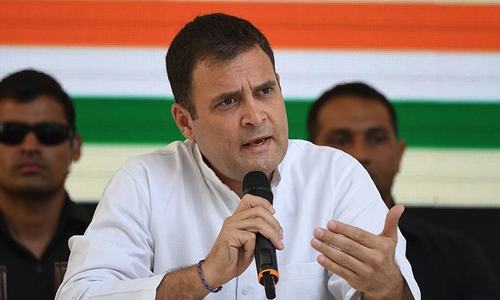Will visit Srinagar myself to see if people are unable to access high court, says India's top judge

Chief Justice of India Ranjan Gogoi on Monday said that he would himself visit occupied Kashmir's biggest city Srinagar to see if people were unable to access the region's high court, India Today reported, but did not pass any order pertaining to restoration of normalcy.
He made the remarks during the hearing of a petition filed by child rights activists Enakshi Ganguly and Professor Shanta Sinha, whose lawyers said that people in the region could not access the Jammu and Kashmir High Court due to a government-imposed lockdown that has been in place for over a month.
The appeal was one of many filed by civil society members pertaining to the ongoing clampdown in occupied Kashmir. The Indian government imposed a strict lockdown in occupied Kashmir last month before it revoked the region's special status.
While hearing Ganguly and Professor Sinha's appeal, Chief Justice Gogoi said: "If you make a statement that it's difficult to approach the HC [high court], it's a very serious statement. Is anyone coming in the way of you going to the high court? Please tell why?"
According to the lawyer, the shutdown in the region was preventing people from approaching the court, India Today reported.
Seeking a report from the region's high court chief justice, the top judge said: "It's very, very serious if people are unable to approach the high court; I will myself visit Srinagar."
Additionally, he warned a lawyer for one of the petitioners that if the report was contrary to what they were saying then they should "be ready for the consequences".
The Indian Supreme Court has also asked the centre to "make all endeavours to restore normalcy in Kashmir as soon as possible".
According to India Today, a bench of the court refused to pass any order on the restoration of the disputed region but said that the restoration would be done on a "selective basis, keeping in mind national interests".
"We are not passing any orders. We are saying restore keeping in mind national security. We have said all facilities should be restored keeping in mind national security. We are not carving out exceptions for any category," Chief Justice Gogoi said.
India's top court also allowed Ghulam Nabi Azad, a senior Congress leader and Leader of Opposition in the Rajya Sabha, to visit occupied Jammu and Kashmir, India Today reported.
While granting him permission, the Supreme Court asked Azad to interact with people in the region and to file a ground report on the situation. It also told Azad not to take part in any political rally, the report added.
Azad was among a delegation of India’s top opposition leaders, including former Congress president Rahul Gandhi, who were sent back after they landed in Srinagar on August 24.















































